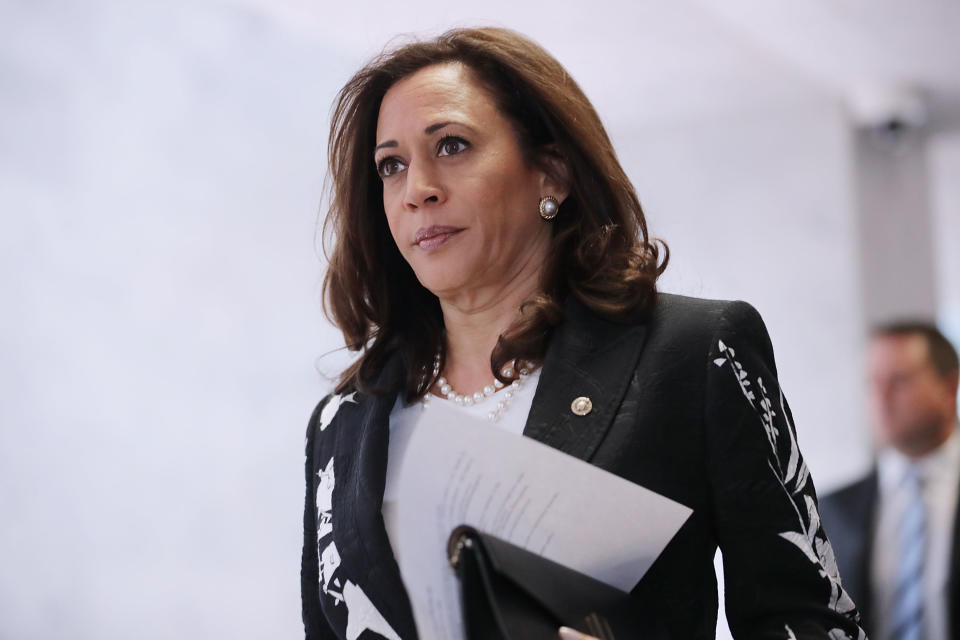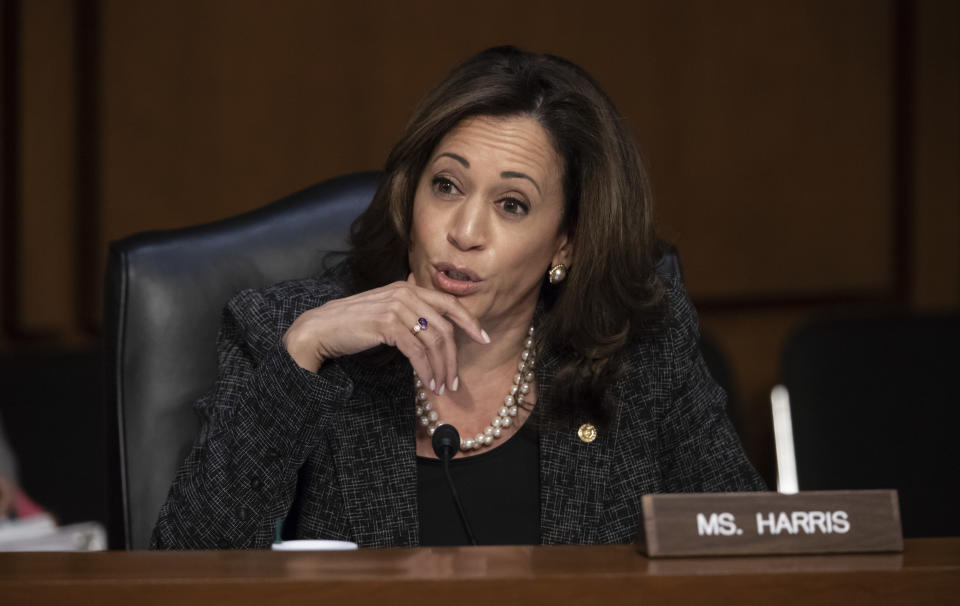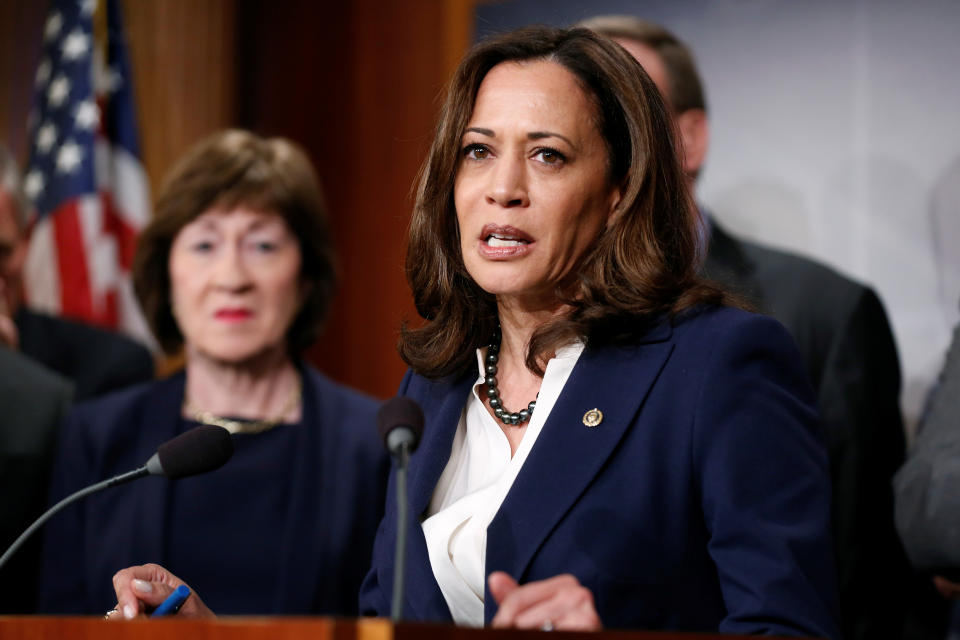Kamala Harris's foreign policy favors a U.S.-built world order, with a wary eye to China and Russia
Kamala Harris, whom Joe Biden tapped Tuesday as his presidential running mate, is a politician best known for her rise through California’s political system to the U.S. Senate, but she has also forged a foreign policy agenda with a hard edge, calling out U.S. adversaries while saying Washington must reclaim its “moral authority” on the world stage.
In an election that will likely focus primarily on domestic issues, including the coronavirus pandemic, the economic downturn and racial equality, not as much attention has been given to Harris’s foreign policy views. But as a potential vice president who is likely to have a substantial policy portfolio as well as her own future ambitions for the top job, her preferences in this area could prove important.
“She has been deeply concerned about Donald Trump’s efforts to isolate the U.S. from the rest of the world,” said Halie Soifer, the executive director of the Jewish Democratic Council of America, who served as Harris’s national security adviser in the Senate from 2017 to 2018. “She and Joe Biden would repair our relationships with the rest of the world and continue to uphold our commitments to our allies, including NATO and other vital alliances.”

Perhaps the most definitive public outline of Harris’s foreign policy views came in the form of written answers she gave in August 2019 to a series of questions posed by the Council on Foreign Relations during her abortive campaign for the Democratic presidential nomination. Her responses laid out a number of positions that largely conformed to centrist Democratic thinking.
For instance, while she was willing to cooperate with China on issues such as climate change, she said that Beijing’s “abysmal human rights record must feature prominently” in U.S. policy toward that country, citing Beijing’s imprisonment of more than a million Uighur Muslims in Xinjiang province and its violent crackdown on peaceful protesters in Hong Kong. “The United States must reclaim our own moral authority and work with like-minded nations to stand up forcefully for human rights in China and around the world,” she said.
Harris also criticized Trump for his handling of North Korean leader Kim Jong Un and the threat posed by the country’s growing nuclear weapons capability. “President Trump has handed Kim one PR victory after the next, all without securing any real concessions, so the next president will have serious work to do,” she told CFR. She added that she would consider the “targeted” and “immediately reversible” relief of certain sanctions on North Korea in order to improve the lives of that country’s people “if the regime were to take serious, verifiable steps to roll back its nuclear program.”
The United States’ ultimate objective must remain complete denuclearization, she said, adding that “we can’t accept North Korea as a nuclear weapons state.”

Harris emerges from her exchange with CFR as a strong advocate for the rules-based international order that critics accuse Trump of undermining. The greatest U.S. foreign policy accomplishment since World War II “has been the postwar community of international institutions, laws, and democratic nations we helped to build,” she said.
In the CFR interview and elsewhere, Harris has also taken strong positions against Russia and particularly its president, Vladimir Putin, criticizing the Kremlin’s use of military force “to undermine democratically elected governments” in Georgia and Ukraine.
Trump’s impeachment stemmed from his alleged efforts to condition aid to Ukraine on an investigation by that country’s government into Joe Biden and his son Hunter. Harris, for her part, vowed to “prioritize working with the government of Ukraine to build out its military, strengthen its civil society, and combat corruption, while working closely with our European partners on a diplomatic solution” to its war with Russian-supported separatists in the country’s east.
As a career district attorney and attorney general in California, Harris had little in the way of foreign policy experience when she was elected to the Senate in 2016, but that didn’t prevent her being named to the Intelligence Committee, where she impressed Democrats and Republicans alike as a quick study who asked searching questions.
“I found her to be very engaged,” a former Senate staffer told Yahoo News. “She did her reading and was prepared, and she was an impressive member of the committee.”

Harris brought her hawkish attitude toward Russia to her work on the committee, according to the former Senate staffer. “She was right in line with the [committee’s other] Democrats, talking about Russian election interference and concern over the coordination and collusion with the Trump administration, asking the tough questions,” the former staffer said.
Should she be elected vice president, Harris’s time on the committee will have served her well by giving her “a solid understanding of the intelligence community,” said Marc Polymeropoulos, a former senior CIA official who retired in 2019.
Such an insight will be “of critical importance given President Trump's near-constant attacks on the intelligence profession over the last three and a half years,” he told Yahoo News. “She will also have had access to the highly classified reporting that went into the intelligence community assessment that detailed Russian interference in the 2016 elections, as well as the most recent sensitive reporting that shows what the Russians and other state actors are up to.”
Larry Pfeiffer, a 32-year intelligence community veteran who now heads George Mason University’s Michael V. Hayden Center for Intelligence, Policy and Security, said he also expects Harris to bring to a Biden administration experience dealing with intelligence on Russian covert operations.
“Vladimir Putin, and those here and abroad who support and enable his efforts to undermine democracy in America and around the world, should begin to sweat,” he said.
_____
Read more from Yahoo News:

